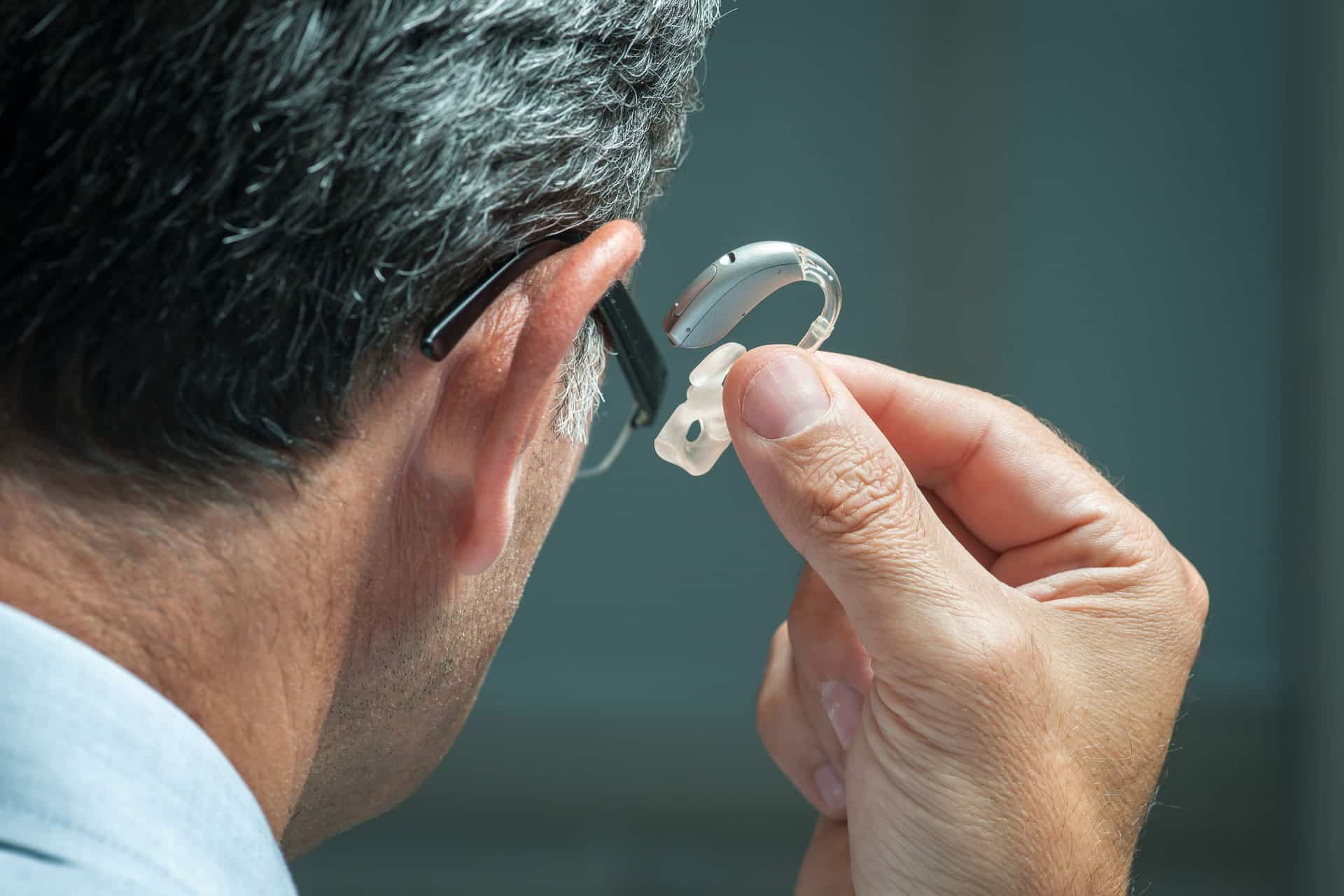Delivery in 2-3 working days
Hearing loss after middle ear infection
Acute otitis media is one of the most common diseases in children and infants. However, it can occur at any age. In addition to typical symptoms such as earache or a feeling of pressure, in the worst case it can cause hearing loss. Hearing loss after a middle ear infection can be temporary if the inflammation is treated promptly and effectively. However, in some cases it can also be permanent and have long-term effects on hearing performance. You can find out more about this topic in our article.
What is otitis media?
An inflammation of the middle ear, also known as otitis media in medicine, is an inflammation of the middle ear. It can be very painful and usually occurs suddenly. Temporary hearing loss can also occur.
This pain usually disappears quickly on its own, but otitis media can also become chronic and lead to permanent hearing loss. However, chronic middle ear inflammation can also develop gradually, without pain and with only mild symptoms. For this reason, it is important to recognize the causes and symptoms in order to avoid more serious consequences such as hearing loss after otitis media.
Causes of hearing loss after a middle ear infection
A middle ear infection can be caused by various bacteria and viruses. The most common causes include, for example, colds or allergies.
The infection can cause fluid to accumulate in the ear, specifically in the middle ear, which can be purulent in the case of bacterial infections. As the fluid impedes the vibrations of the eardrum and the ossicles in the ear, it can lead to temporary hearing impairment or hearing loss after the middle ear infection.
If too much fluid or pus collects in the middle ear, this can result in a perforation of the eardrum. The membrane is perforated and the sound is then not transmitted effectively to the inner ear. An inflammation of the middle ear can also damage the ossicles. If this happens, sound waves can no longer be transmitted properly.
In severe cases, inflammation of the middle ear damages the auditory nerve. This is responsible for transmitting sound signals from the inner ear to the brain. Damage can lead to permanent hearing loss.
Therefore, if you have an earache, you should always consult a doctor who will prescribe an antibiotic if necessary.
Recognize symptoms of middle ear infection:
A middle ear infection can cause various symptoms, ranging from mild problems to severe pain. The typical signs include
Feeling of pressure in the ear
The fluid in the ear can cause a feeling of pressure.
Earache
They usually occur suddenly and can worsen in different situations, for example when lying down or sneezing.
Hearing problems or hearing loss:
Hearing problems or temporary hearing loss often occur after a middle ear infection.
Leaking liquid
If the inflammation causes a hole in the eardrum, fluid can leak out of the ear. This may be clear, yellowish or even bloody.
Fever
When the body is fighting an infection, it often reacts with a fever - even in the case of a middle ear infection.
Irritability and malaise
Occurs as a result of a middle ear infection, especially in children. Nausea, diarrhea and sleep problems are also typical symptoms in children and infants.
If you notice one or more of these symptoms in yourself or your children, it is advisable to consult a doctor in order to avoid more serious consequences such as a tympanic effusion or hearing loss after otitis media.
Diagnosis of hearing loss after middle ear infection
To find out whether the symptoms are hearing loss due to otitis media, you need to see an ear, nose and throat specialist. After an initial questioning about your symptoms, the doctor can make a diagnosis with the help of various examinations. To do this, they will look into the ear using an otoscope, a special ear mirror for examining the external auditory canal and the eardrum. The ENT doctor will use various hearing tests to identify possible hearing problems or temporary hearing loss.
Based on these examinations and hearing tests, the ENT can determine the appropriate treatment options, for example medication or tympanic tubes (tympanic drainage).
What now? Treatment options for hearing loss after middle ear infection
As with most illnesses or complaints, the same applies to middle ear infections: take it easy! It is particularly important to take it easy if you suffer from hearing loss after a middle ear infection - in the truest sense of the word.
Further treatment will be determined by your ENT specialist. They may, for example, prescribe medication such as antibiotics to alleviate your symptoms and promote the healing process. Although the symptoms often disappear after a few days, this process can take a few weeks. Regular medical check-ups and further examinations if the symptoms worsen are important to ensure that the infection has completely cleared up and no complications arise.
Home remedies for earache
It is important to note that severe or persistent ear pain should always be treated by a doctor.
In addition to treatment by a doctor, there are some home remedies that can help to relieve ear complaints:
Heat:
Applying a hot water bottle or a warm cloth to the sore ear can have a soothing effect.
Ear oil drops:
Some people find relief by using warm ear oil drops.
Onion:
A sliced onion or onion pouches placed near the ear can have an anti-inflammatory effect and relieve pain.
Nasal rinsing:
A nasal rinse with a saline solution can help to clear the sinuses and reduce the pressure in the ear caused by a blocked nose.
Inhalation:
Inhaling steam over a bowl of hot water, possibly enriched with essential oils, can help relieve ear discomfort by opening up the sinuses and reducing pressure in the ear.
It is important to emphasize that these home remedies are only for temporary relief of symptoms and are not a treatment for the infection itself.
Prevention of hearing loss after a middle ear infection
Prevention is better than cure. Certain measures can help to reduce the risk of recurring middle ear infections. These include, for example, taking it easy when you have a cold, avoiding allergenic substances and humidity, which can encourage the growth of bacteria. A healthy lifestyle, including a balanced diet, adequate hydration and regular exercise, can strengthen the immune system and help reduce the risk of infection.
In addition, wearing hearing protection during activities such as loud music or work noise that can damage hearing can reduce the risk of hearing loss, .
It is important to take care of your hearing health and consult a doctor immediately if you have any concerns or symptoms of hearing loss.
Living with hearing loss
Even if you have been diagnosed with permanent hearing loss or hearing loss, there are some things that can help you cope with everyday life and improve your quality of life. These include, among others:
Hearing aids or cochlear implants:
If a permanent hearing loss has been diagnosed, hearing aids or cochlear implants can help to improve hearing and facilitate communication.
Auditory training:
An audiologist can help you optimize your remaining hearing and develop strategies to better cope with hearing problems. Hearing training can also help to improve your ability to understand speech.
Lip reading and sign language:
Learning to lip read and sign language can help to improve understanding during conversations.
Supporting technologies:
There are a variety of aids for the hearing impaired, including telephone amplifiers, vibrating alarm clocks, TV hearing amplifiers and technologies for accessible television.
Psychological support:
Hearing loss can be emotionally stressful. Psychological counseling or support groups can help to deal with the challenges and strengthen mental health.
Communication training for family and friends:
The support of family and friends is important. Communication training can help to develop effective communication strategies and avoid misunderstandings.



